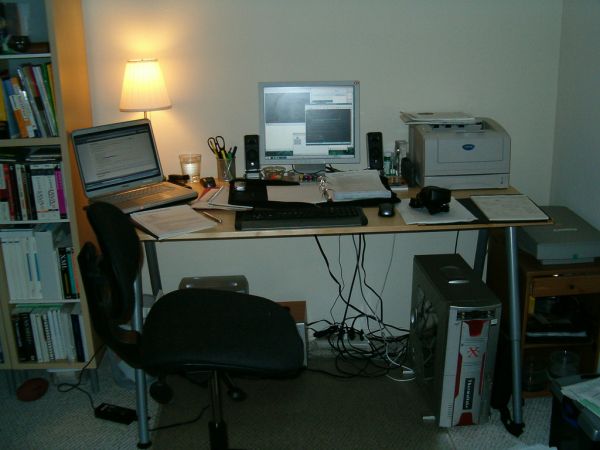In this post I share seven of the many mistakes when I set up my own business working from home.
Those mistakes surely cost me business and money in the short term, but I believe I learned from all of them.
I hope by sharing my experience I can help some others who may be establishing themselves in this way of business and life.
And from conversations with many home based business owners over the intervening years, it seems to me that these following seven mistakes were not just mine and are commonly made:
- Not getting priorities right from the outset
- Spending money before you make it
- No business strategy
- Not marketing the new business
- Underquoting
- No order book
- Not thinking like a business owner
1. Not getting priorities right from the outset
When I first set up my home based business I spent too much time on setting up a spare bedroom as my office space, and getting my stationery designed and printed. I also spent a lot of time researching and deciding on the purchase of a computer, printer and fax machine (remember fax machines?).
So where was the mistake here?
The key mistake was in focusing on these things before I attended to more fundamental issues, like working out my business aims (beyond being free of bosses other than myself) and actually getting out and finding clients.
With my time over, I would:
- do some serious brainstorming about my business aims and objectives
- put the task of getting clients as my first and dominant priority.
Which leads me to my next, closely related mistake.
2. Spending money before you make it
The purchase of the technology for my business before I had any clients made sense at the time, but now I see it differently. I was buying expensive equipment – computers were not the commodity then that they are now – before there was any income lined up to pay for it. I was raiding my working capital before I had clients!
Likewise the design and printing of stationery.
It would have been so much smarter and more financially prudent to spend some time and energy in lining up clients and contracts and then committing to expenditures once I had some cashflow – or at least had contractual assurance of income to cover those expenditures.
3. No business strategy
In my working life before home business I had done a lot of strategic planning for major, multi-million dollar projects. And one of my strengths had long been, and is, an ability to think strategically.
So why did I not put serious time and thought into developing a detailed business plan?
I can only think I must have had a very simplistic or limited view of what was involved in establishing and building a business from home.
With my time over and the knowledge I now have, I would take time (while still in a salaried position if possible) to do some study of business planning and work out a detailed plan for my own business.
And I would use some of the excellent and freely available online resources I listed in my recent blog post, Looking for a Free Small Business Plan Template? Try These Resources.
4. Not marketing your new business
For many of us professionals starting out with our own home based business, marketing is something other people have done. Some professional service practitioners have a real aversion to doing any marketing or sales.
Looking back, I can see that once I had the first consulting contract for my new business I put my available time and energy into that.
Then I lined up another one and put my efforts into that.
I was doing some marketing, but not as a seriously planned and regularly evaluated process.
I would have been able to build much more soundly and effectively by having a documented marketing strategy from the outset and applying that consistently.
5. Underquoting
When I think back over the years about the times I have clearly underquoted, especially in relation to the scope and time demands of particular projects, my best explanation of why I underquoted is that I was either trying to guess what the client would think was a fair quote, or trying to accommodate a client who was offering only half of, or less than, what the real price of the work should have been.
And, quite probably, part of my underquoting was from being conscious of being a solo operator working from home and allowing myself to “think small”.
Nowadays I have a better sense of the value I have to offer and what that means in terms of remuneration. It’s still my brain, my expertise, my experience that is being hired, not the building I work in or how many or few people there are around me.
A good business plan can help overcome this particular bit of self-sabotage.
And as I have experienced personally, a good business coach can more than pay her or his way by helping us identify our real worth and potential value to a client, so that we get over any tendency to underquote or otherwise under-sell ourselves and what we have to offer.
6. No order book
I had been in business a while before a very experienced and wise businessman told me about the crucial importance of having forward commitments for business, or as he put it a well-filled order book. He pointed out to me that it was easy to dwell on current business as a mark of achievement but a better measure of a business operating well was to have an order book which was full for the coming six months.
Again, rather than just being grateful for a current contract, putting my head down and completing that, I needed to be continually and consistently devoting some serious time and energy to building the business and filling the order book.
7. Not thinking like a business owner
Like many people who set up a home based business, I did so after many years as an employee. I had learned to think like an employee and did not realise that just setting up my home office and getting some consulting contracts would not be enough to turn my thinking into that of a business owner.
And while I loved getting new business and being paid for my work, it took me much too long to realize that if I wanted to still be in business for more than a couple of years I needed to become much more focused on making a profit.
While of course still doing quality work.
Once I realized that in various ways I was still thinking like an employee I set myself to learn more about business and how to enjoy and relish the fact of being in business and thinking like a business owner.
That led in turn to a realization that I had some pre-conceptions and attitudes that could quickly undermine my dream of having my own sustainable business. See for example the item above about underquoting.
So as well as discovering I needed to learn some practical things about business administration, product development, marketing, sales and customer service, I realized I needed to sign up for some serious personal development.
Which I did.
But that’s a topic for another post (or several!)
Care to add to the list?
I’m sure I made other mistakes in getting started in home based business, but I believe I would have made faster progress if I’d identified and nailed, early on, the ones above.
Anyway, I am quite sure that having learned most of my lessons the hard way, through making mistakes and finding solutions, I am now better equipped to help others in my coaching. As they say, you can learn a lot from The School of Hard Knocks.
Do you have some thoughts to share on this topic of the mistakes people make in setting up and developing a home based business? Please feel free to share them in the Comments section.
Image credit: Home office, via Flickr, by newchaos, CC BY 2.0
Latest posts by Des Walsh (see all)
- Why I Love it – Sort of – When People Unsubscribe from My Updates - February 4, 2014
- Being Busy is OK, but it’s not an Excuse for Discourtesy - January 24, 2014
- Are You Using LinkedIn’s Power to Help Grow Your Business? - January 23, 2014







I would definitely agree with this area: “Not thinking like a business owner”.
If you are at home, it feels like you are just at home and your attitude pulled back by the environment which is you home.
Well, I guess the best thing to make a great home based business is you set up a home office that really looks like a real office and make sure it is far from any house disturbances.
Marnie, thanks for the comment.
I’m sure it can help many people to have an office that, as you say, “looks like a real office” and is far from general house noise.
I have to say though that such an arrangement will not always be practicable. For a time I ran my business literally from the kitchen table. Once breakfast was over we’d clear the table and I would set up for the day’s work. A business associate arrived one morning when we were a bit late over breakfast and chided me for not being ready for us to start work!
And I’ve met plenty of people with a dedicated space for their home office who still think like employees and wish they were back working for someone else.
Whether with a dedicated space or not, one group who have an extra challenge are parents with young children who don’t get the “don’t disturb” message.
As in any business you are planning you should weigh things out already to avoid failure but most business owners still fails because of those basic mistakes stated in this post.
Excellent post Des. I have set it up to be RT within my Buffer App. If I had to add a mistake I would say getting organized.. that means organizing tax information into one location so that you know where to find it at the end of the year.
Thanks Brett. Your point about organizing tax in one location reminds me of when I first set up a new company and asked the accountant – he was a partner in a substantial firm – what system he would like us to us for managing the accounts on a day to day basis. He said, “I don’t care what system you use, as long as you have a system.” And I clearly remember he added “Even a shoebox is a system.”
LOL. I like it. Good advice.